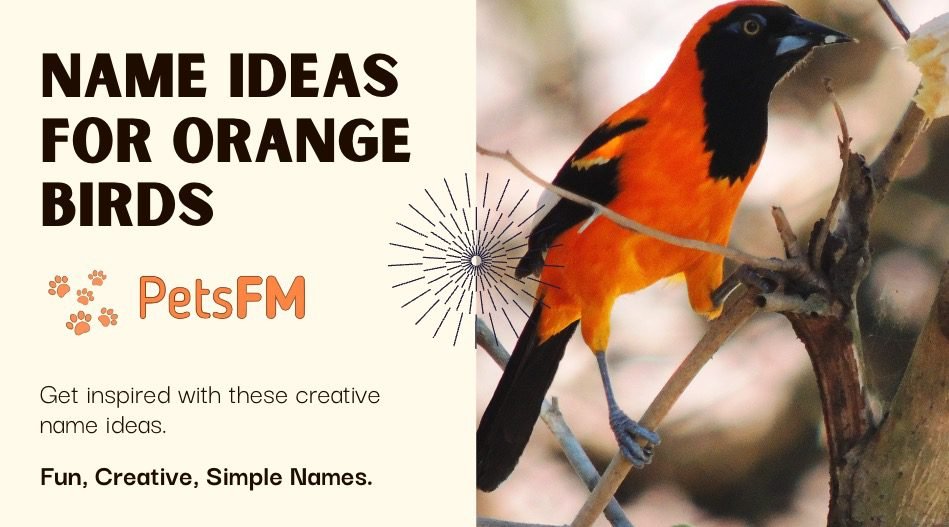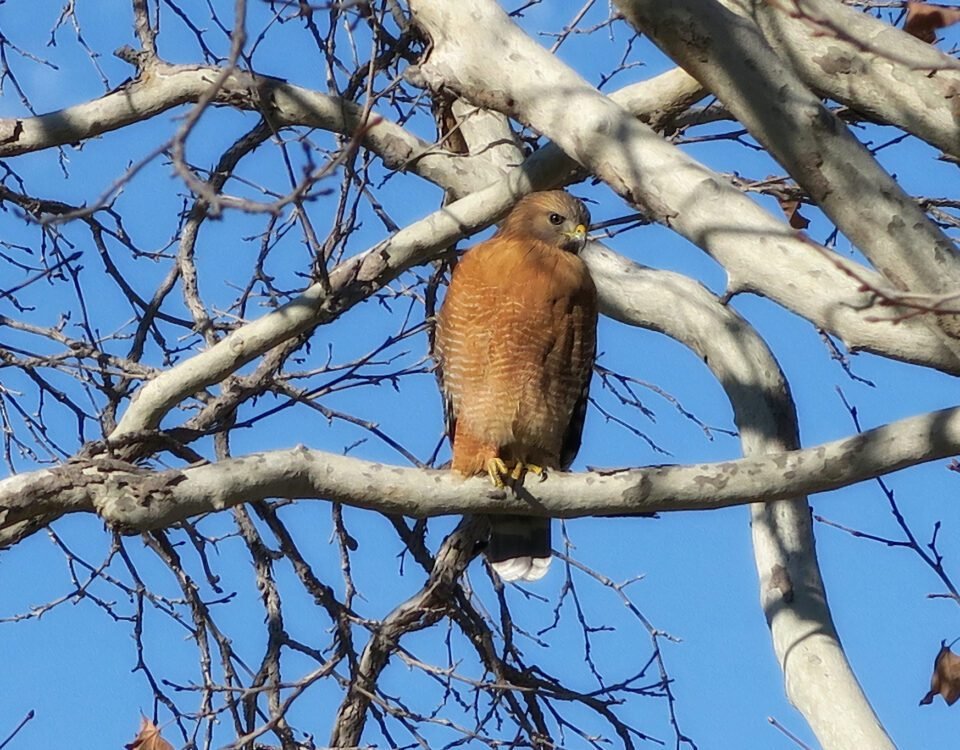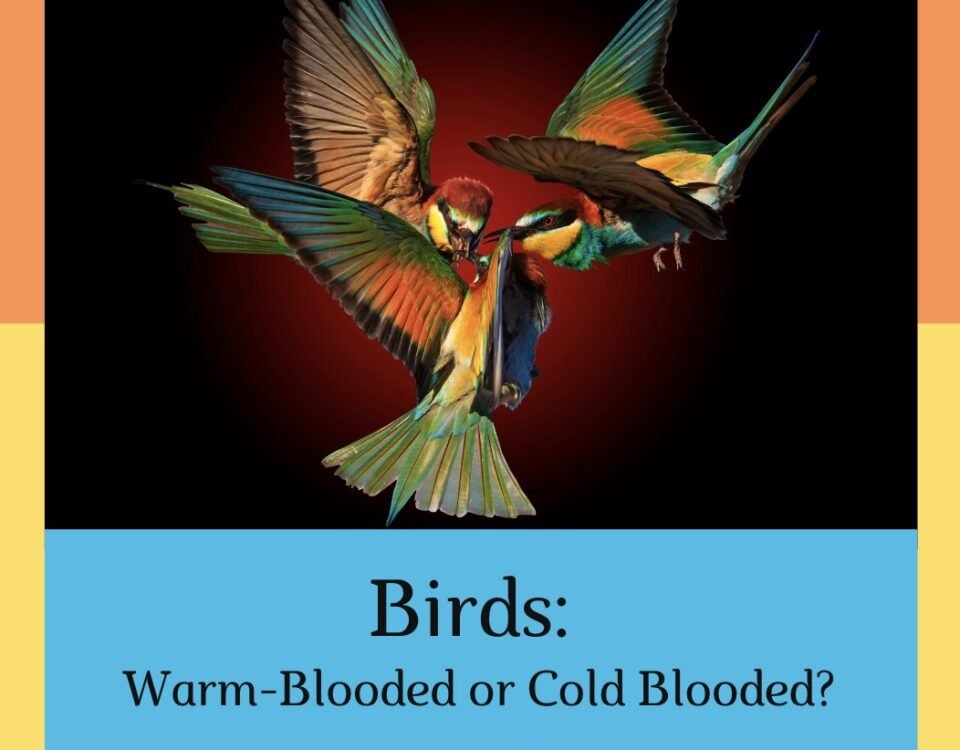


Caucasian Shepherd x German Shepherd Mix Breed Guide
January 4, 2024


Are Fish Good Pets? 10 Things to Consider Before Getting One
February 18, 2024Parakeets, also known as budgies, with their vibrant colors and lively personalities, are beloved pets worldwide. A crucial aspect of caring for these charming birds involves providing them with a nutritious and varied diet. While seeds are an everyday staple, the importance of incorporating fruits and vegetables for a well-rounded diet cannot be overstated.
Among the many options, strawberries are compelling, raising questions about their suitability for parakeet consumption. Here’s a quick answer:
Parakeets can eat strawberries. However, it’s important to note that strawberries have fructose and salicylic acid, substances that, in excessive amounts, can negatively impact their health or even prove toxic. Therefore, offering strawberries to parakeets only as an occasional treat, ideally once or twice a week, is advisable to avoid potential health issues.
This blog explores whether strawberries can safely be included in a parakeet’s diet, highlighting the importance of dietary variety in ensuring the health and happiness of these feathered companions.
Can parakeets eat strawberries?
Yes, parakeets can eat strawberries, but in moderation. Strawberries, rich in vitamins and antioxidants, can be a healthy addition to a parakeet’s diet.
These fruits offer a variety of nutrients beneficial for their overall health, including vitamin C, which supports immune function, and manganese, which is essential for bone health and metabolic processes.
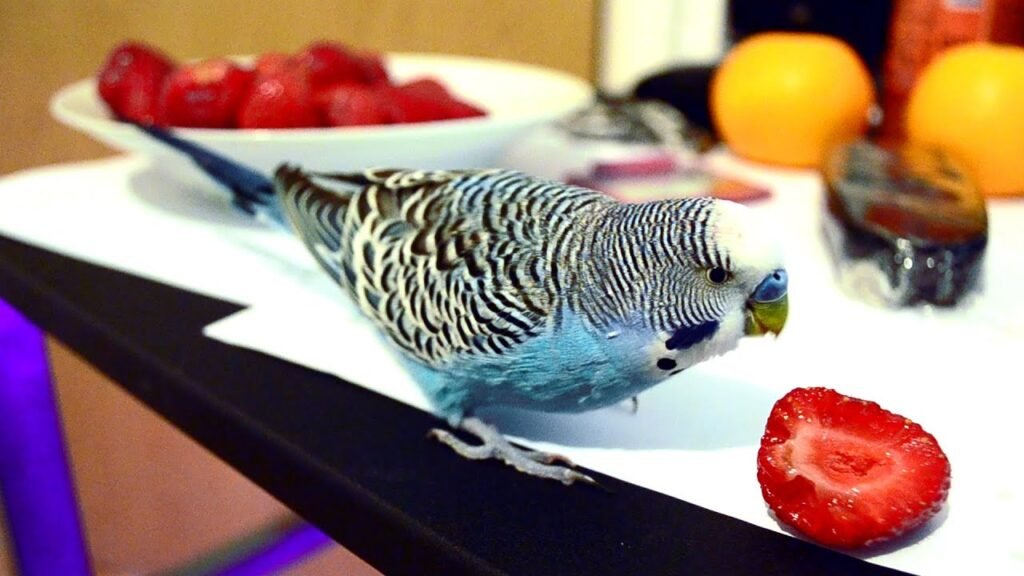

Budgie (Parakeet) eating a strawberry
However, strawberries contain sugar and should be given in limited quantities to prevent obesity and other health issues. It’s crucial to wash strawberries thoroughly to remove any pesticides or chemicals before feeding.
Serving strawberries once or twice a week as a treat is recommended to maintain a balanced diet for your parakeet.
Parakeet’s dietary needs
A healthy parakeet diet encompasses a mix of seeds, fresh fruits, and vegetables, reflecting the diverse nutrients they would naturally encounter in the wild.
Seeds alone can lead to nutritional imbalances; hence, including fresh produce is vital for a well-rounded diet. Essential nutrients for parakeets include vitamins A, C, and D, minerals like calcium for bone health, and proteins for muscle maintenance.
Variety prevents nutritional deficiencies and enriches the parakeets’ environment, stimulating their minds and encouraging natural foraging behaviors. This dietary diversity ensures they receive all necessary nutrients for optimal health and longevity.
Strawberries and their nutritional value- Are they beneficial for parakeets?
Strawberries are a nutritious fruit that can offer several health benefits to parakeets when included in their diet.
- These bright red berries are rich in vitamin C, an antioxidant that supports immune system health, preventing diseases and infections.
- Strawberries also provide a good source of vitamins A and K and minerals such as potassium and manganese, contributing to a parakeet’s overall well-being.
- Vitamin A is crucial for maintaining healthy eyesight and skin, while potassium supports heart health and muscle function.
Benefits
- Including strawberries in a parakeet’s diet can enhance nutritional intake, promoting better health and vitality.
- The fiber found in strawberries can aid in digestion, helping to keep the digestive system running smoothly.
- Additionally, the natural sugars in strawberries can be a tasty treat for parakeets, making them a suitable reward far healthier than many commercial bird treats.
However, due to their sugar content, strawberries should be in moderation to avoid obesity and other health issues. By incorporating strawberries as an occasional treat, parakeets can enjoy this fruit’s taste and nutritional benefits without any adverse effects.
| Name | Amount |
| Energy | 5.2 Calories |
| Protein | 0.11 g |
| Carbohydrates | 1.28 g |
| Of which sugars | 0.85 g |
| Fiber | 0.34 g |
| Calcium | 2.9 mg |
| Magnesium | 2.3 mg |
| Potassium | 27 mg |
| Selenium | 0.07 µg |
| Vitamin C | 10.5 mg |
| Vitamin A | 0.2 µg |
| Folate | 4.3 µg |
What are the different types of strawberries that parakeets can eat?
Parakeets can enjoy various types of strawberries, just as humans do. However, when feeding strawberries to parakeets, the focus should be more on the fruit’s freshness and preparation rather than the specific variety.
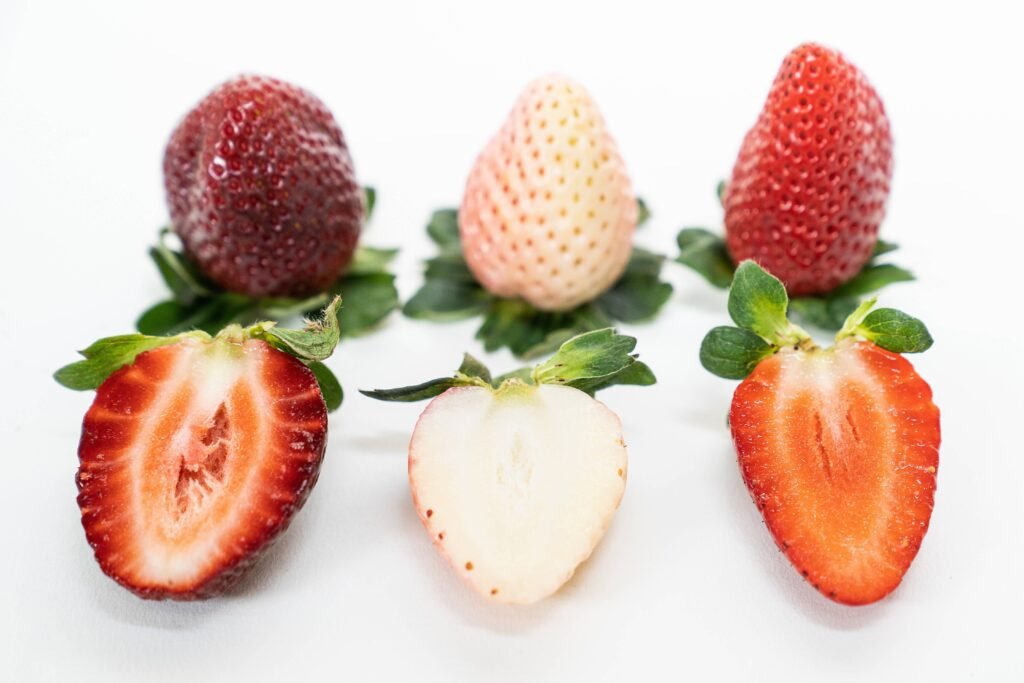

Here are a few common types of strawberries that are safe for parakeets, provided they are adequately prepared:
- Garden Strawberries (Fragaria × ananassa): The most common type found in supermarkets, garden strawberries are sweet and juicy, making them a favorite treat for parakeets.
- Wild Strawberries (Fragaria vesca): Smaller and more intense in flavor, wild strawberries are a delightful treat. They’re often found in forests and meadows but can also be grown in gardens.
- Alpine Strawberries (Fragaria vesca var. semperflorens): Similar to wild strawberries, alpine strawberries are small, with a rich, sweet flavor. They can be a gourmet treat for your feathered friend.
- Organic Strawberries: While not a separate variety, choosing organic strawberries can reduce the risk of pesticide exposure, making them a safer option for your parakeet.
Preparing Strawberries for Parakeets
Proper preparation is key to ensuring strawberries are safe and enjoyable for your parakeet. This involves thoroughly washing the strawberries to remove any pesticides or dirt, cutting them into small, manageable pieces, and ensuring there are no seeds that could pose a choking hazard.
Washing
Rinse strawberries under cold running water to wash away any contaminants.
Cutting
Slice the strawberries into small pieces that your parakeet can easily eat.
Removing Seeds
While strawberry seeds are generally small and not harmful, ensure there are no large seeds or hard parts that might cause issues.
How much strawberry is safe for parakeets?
Strawberries can be a delightful treat for parakeets, but they should be given in moderation due to their sugar content. A safe frequency is offering strawberries to your parakeet once or twice a week. As for the amount, a small piece or two, depending on the size of the strawberry and the bird, is sufficient.
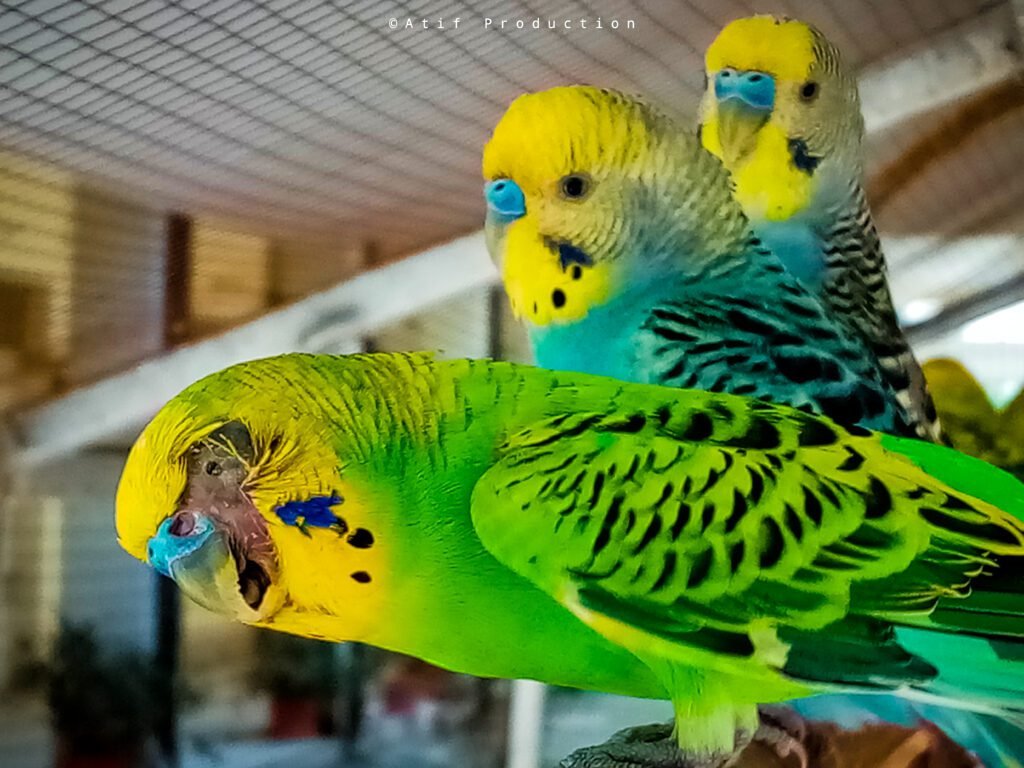

Budgies, aka Parakeets or Small parrots
This controlled portion helps prevent potential health issues related to overconsumption of sugar, such as obesity or digestive problems, ensuring your parakeet enjoys the benefits of strawberries without any adverse effects.
Can strawberries be toxic to these birds?
Feeding strawberries to parakeets comes with potential risks that owners should be aware of to ensure the safety and health of their feathered friends.
The primary concerns include pesticides and the natural sugar content in strawberries.
Pesticides
Strawberries often rank high on lists of fruits contaminated with pesticides. These chemical residues can harm parakeets, potentially leading to health issues over time.
Sugar Content
While the natural sugars in strawberries are not harmful in small amounts, overfeeding can lead to obesity and related health problems in parakeets. Their tiny bodies and fast metabolism mean that even small excesses can have significant effects.
Eliminating Risks
To safely include strawberries in your parakeet’s diet, take the following precautions:
- Organic Produce: Opt for organic strawberries when possible, as they are less likely to contain harmful pesticides.
- Thorough Washing: Whether you choose organic or non-organic strawberries, wash them thoroughly under running water to remove any surface chemicals or dirt. A produce wash can also be used for an extra level of cleanliness.
- Moderation: Limit strawberry treats to once or twice a week and offer only small pieces to avoid the risks associated with high sugar intake.
- Variety: Ensure strawberries are part of a varied diet that includes other fruits and vegetables, providing a range of nutrients and reducing the reliance on any single food source.
Are strawberry leaves safe for parakeet consumption?
Yes, strawberry leaves are generally safe for parakeets to consume. In fact, they can be a good source of additional nutrients and provide a bit of variety to your bird’s diet.
Strawberry leaves contain antioxidants and are believed to have anti-inflammatory properties. However, as with the fruit itself, it’s essential to thoroughly wash the leaves to remove pesticides or chemicals.
Organic leaves are preferable to minimize the risk of chemical exposure. When introducing any new food, including strawberry leaves, it should be done gradually to monitor for any adverse reactions.
Are there any alternatives to strawberries for parakeets?
While strawberries are a tasty and nutritious treat for parakeets, it’s essential to provide a variety of fruits to ensure a balanced diet. Many other fruits are safe and beneficial for parakeets, offering a range of flavors and nutrients.
- Apples: Rich in fiber and vitamins, ensure they are peeled and seedless before offering them to your parakeet.
- Bananas: A good source of potassium and natural sugars, bananas can be fed in small amounts due to their higher sugar content.
- Blueberries: Packed with antioxidants and vitamins, blueberries are a healthy snack that most parakeets love.
- Melon: Watermelon, cantaloupe, and honeydew are hydrating and vitamin-rich but should be given in moderation due to their sugar content.
- Pears: Another fiber-rich fruit, pears should be offered without the seeds and in small pieces.
These fruits and strawberries can contribute to a varied and nutritious diet for parakeets, keeping them healthy and happy.
Conclusion
In summary, strawberries can be a healthy and enjoyable addition to a parakeet’s diet, offering essential vitamins and minerals. However, they should be introduced cautiously, in moderation, and as part of a balanced diet to avoid potential risks associated with pesticides and high sugar content.
By properly preparing strawberries and serving them alongside other fruits and vegetables, owners can ensure their parakeets enjoy both nutritional benefits and dietary variety.

